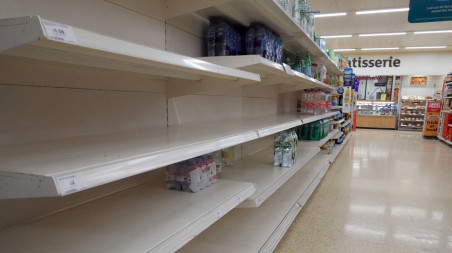The return of empty shelves and panic buying
Supply chain issues are leaving supermarket shelves empty. Shoppers might yet make things worse

Walk around a supermarket in the US or Europe and you will see some empty shelves once more. This isn't due to people panic-buying toilet paper, as they did early on in the pandemic; rather it's because supply chains are clogged at almost every stage between Asian factories and grocery stock rooms.
But rising prices and patchy availability mean it's only a matter of time before shoppers start purchasing in bulk again — this time to avoid future sticker shock.
Supply lines are struggling as producers such as Vietnam, responsible for making everything from sneakers to coffee, are hurt by Covid restrictions. Surging virus cases and consumer demand are leading to congested ports. Shipping containers are in the wrong place. Sea freight costs are up tenfold. If goods do arrive at the destined ports, there are too few truck drivers to transport them to retailers. Shortages of workers to harvest and prepare foods are also adding to the pressures.
Some sectors are bearing the brunt worse than others. Beverages, for example, have been hurt by a shortage of packaging including aluminum cans. In Britain, a lack of C02 amid spiraling energy costs has also put supplies of carbonated soft drinks at risk.
In some areas, issues have been compounded by elevated demand. Coffee and tea are hot commodities as many Americans continue to work remotely. Why visit Starbucks Corp. when you can still be a barista at home?
Meanwhile, in-person learning has fueled a rush for school supplies, including those that go in lunchboxes. Following a year quaintly characterized by home-baking and the return of family dinners, parents are now in a frantic state because of a run on Kraft Heinz Co.'s pre-packaged Lunchables. Kraft Heinz said the almost-charcuterie-board-like snack packs are experiencing double-digit growth for the first time in five years.
Pet food is another challenging area. Purina maker Nestle SA has already ramped up capacity. Some grocers are reporting a struggle to find enough dog treats and cat biscuits to meet the demand from all those new pandemic pets.
Retailers have been reengineering their supply chains to avoid the pinch points. Some, including Walmart Inc. and Target Corp., have been chartering their own ships. Amid a shortage of drivers, some British supermarkets are using their own trucks for deliveries that previously would have been carried out by suppliers.
But more adjustments will be needed. Stores may have to cut back on the varieties of goods to reduce complexity, meaning fewer product choices for consumers. Grocers need to plan for the worst. With the system so fragile now, what would happen with further spikes in prices, demand and panic-buying?
In the US, special offers are already being reined in, and some everyday prices are beginning to rise, according to data provider IRI. Energy drinks, eggs, meat and soft drinks are all getting more expensive, IRI's Consumer Packaged Goods Inflation Tracker shows.
When prices go up, consumers tend to get proactive and change their habits. Shoppers first switch out of pricier products to cheaper ones. That means ditching big brands for more competitive private labels. Substituting meat in meals for more affordable pasta, rice or potatoes becomes a common way to save money.
Then comes the buying in bulk and crowdsourcing. With food costs expected to rise further, consumers may choose to load up on products such as pet food while they can. It wouldn't be surprising to see people get together with friends to buy giant packs of toilet paper or minced meat. Splitting bulk buys gives them a better deal without tying up as much cash in the cupboard.
With social media sites like Facebook awash with money-saving groups and TikTok influencers offering budgeting tips, consumers are likely to get more creative than clipping coupons.
While a little inflation is generally good for supermarkets as it elevates the overall value of sales, the danger comes when it exceeds manageable levels and consumers trade down to cheaper items.
Even more pernicious is when people flock to the hard discounters, such as Aldi and Lidl, which have already conquered Europe and are now expanding across the U. S. Many customers stayed away from these smaller supermarkets during Covid, when they switched back to doing a weekly shop at a big-box store.
Up until now, grocers haven't had a bad pandemic. That may be about to change.
This column does not necessarily reflect the opinion of the editorial board or Bloomberg LP and its owners.
Andrea Felsted is a Bloomberg Opinion columnist covering the consumer and retail industries. She previously worked at the Financial Times.
Andrea Felsted is a Bloomberg Opinion columnist covering the consumer and retail industries. She previously worked at the Financial Times.
Disclaimer: This article first appeared on Bloomberg, and is published by special syndication arrangement.



 Keep updated, follow The Business Standard's Google news channel
Keep updated, follow The Business Standard's Google news channel
















